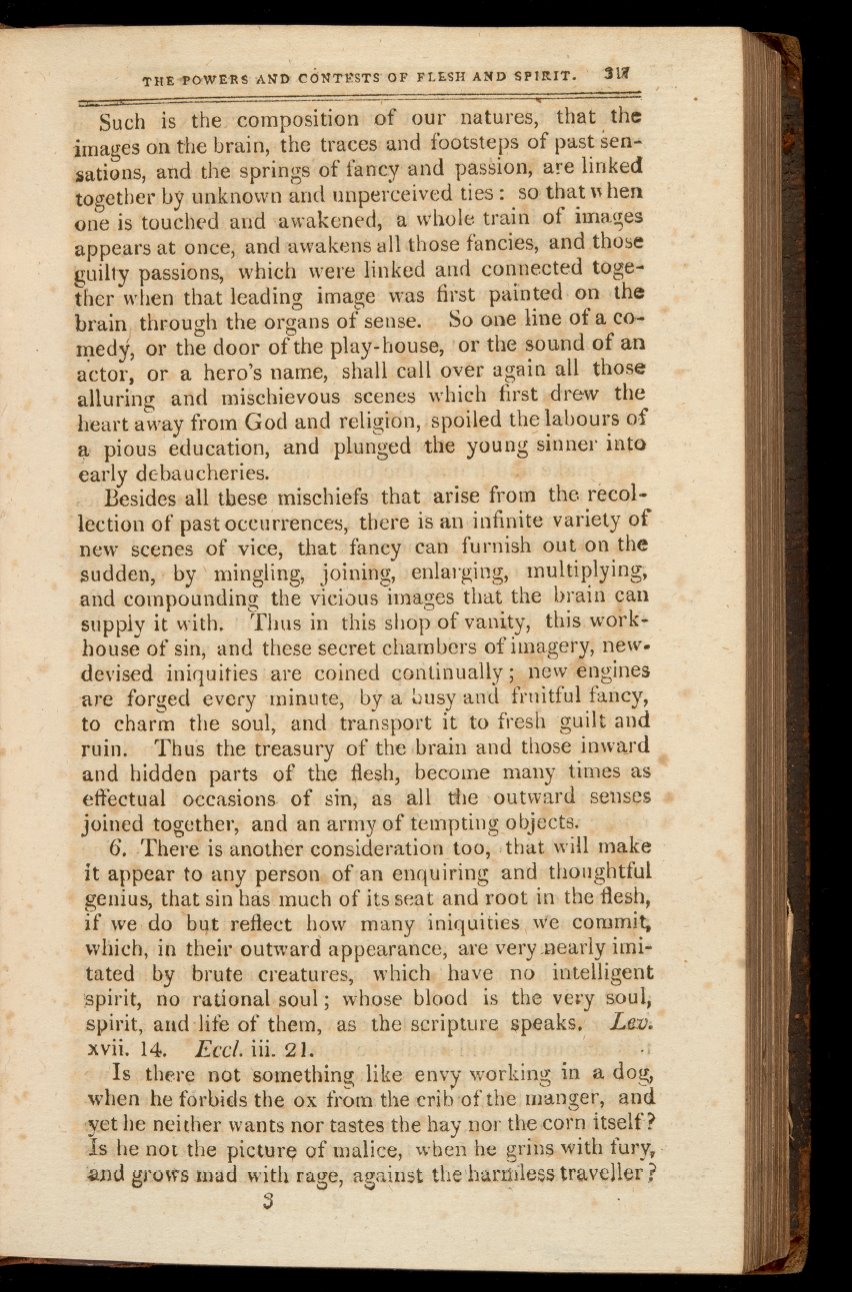

THE TOWERS
AND CÓNTFSTS
OF FLESH AND
SPIRIT.
sta
Such
is
the composition
of
our
natures,
that the
images on
the brain, the traces and footsteps
of
past sen-
sations, and the
springs
of fancy and
passion,
are
linked
together
by
unknown
and unperceived
ties
:
so
that
is
hen
one
is
touched
and
awakened,
a whole
train
of
images
appears at
once,
and awakens
all
those
fancies,
and
those
guilty passions, which were linked
and connected
toge-
ther
when
that
leading
image
was
first
painted
on
the
brain through the organs
of
sense.
So
one line
of a
co-
medÿ,
or
the
door of
the play
-
house,
or
the sound
of an
actor,
or a hero's
name, shall call
over again
all
those
alluring
and
mischievous scenes which first
drew the
heart
away
from
God
and religion, spoiled
the
labours
of
a
pious education, and plunged
the
young sinner
into
early debaucheries.
Besides all
these mischiefs
that
arise from the
recol-
lection
of
past occurrences, there
is
an infinite variety
of
new scenes
of
vice,
that
fancy can
furnish
out
on
the
sudden,
by
mingling,
joining,
enlarging, multiplying;
and compounding
the vicious
images
that
the brain can
supply it
with.
Thus
in
this
shop
of
vanity, this
work-
house
of
sin,
and these secret chambers
of
imagery, new
-
devised
iniquities
are
coined continually
;
new
engines
are
forged every minute,
by
a
busy
and fruitful
fancy,
to charm
the
soul,
and
transport it
to fresh
guilt
and
ruin. Thus
the
treasury
of
the brain and
those
inward
and
hidden parts
of
the
flesh,
become many times as
effectual occasions
of
sin;
as all
the outward
senses
joined
together, and an army
of
tempting
objects.
6.
There
is
another consideration too,
that
will
make
it
appear
to any
person
of
an
enquiring
and thoughtful
genius,
that
sin
has much
of
its
seat and
root
in
the
flesh,
if
we
do
but
reflect
how
many
iniquities
we
commit;
which,
in
their
outward
appearance,
are very.nearly imi-
tated
by
brute creatures,
which
have
no
intelligent
spirit,
no
rational
soul
;
whose blood
is
the
very soul,
spirit, and-life
of
them,
as
the scripture speaks.
Lev:
xvii.
14.
Eccl.
iii.
21.
Is there
not
something
like envy working in
a
dog,
when he
forbids the
ox
from the crib
of
the manger,
and
yet
lie
neither
wants
nor tastes
the hay
nor
the corn
itself?
Is
he
not
the
picture of
malice, when
he
grins with fury,
:and
grows
mad with rage,
against
the!haruiless
traveller?
3

















